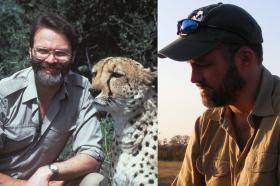
LMH Fellows Professor David Macdonald and Dr Andrew Loveridge have been identified as the two most productive authors of publications related to human-wildlife conflict (HWC) in the last 20 years.
In a recent analysis of published literature in the field of human-wildlife conflict, published in the journal Regional Sustainability, the authors found that Professor Macdonald and Dr Loveridge were the two most productive authors of publications related to human-wildlife conflict (HWC) between January 1991 and February 2023. During that time, Professor Macdonald contributed a total of 29 publications, with Dr Loveridge contributing 15. Professor Macdonald was also the top cited author during the same period.
Oxford’s first Professor of Wildlife Conservation, Professor Macdonald is the founder of WildCRU, where he served as Director for 36 years, and is Wildlife Research Fellow at Lady Margaret Hall. Since Professor Macdonald founded WildCRU in 1986, the first programme of its kind at the time, it has grown into a global network of over 70 researchers and has played a formative part in the careers of countless conservationists. WildCRU, now part of the University of Oxford’s Department of Biology, brings together researchers from across a range of disciplines, and aims to bridge the gap between academic theory and practical problem solving, seeking out workable solutions to complex conservation issues.
Professor Macdonald also provided a Commentary on Current Policy as part of the Badger Trust’s recently-released report: ‘Tackling Bovine TB Together: Towards Sustainable, Scientific and Effective bTB Solutions’. Professor Macdonald’s commentary was recently quoted in The Guardian in an article covering the Badger Trust report.
Dr Loveridge is a Senior Research Fellow at LMH and Deputy Director of WildCRU. Over the last 20 years his research and conservation work on lions and other large carnivores has encompassed lion population management, impacts of trophy hunting, socio-biology, behaviour, predator-prey relationships, human-wildlife conflict and its mitigation, landscape ecology, and trade.


